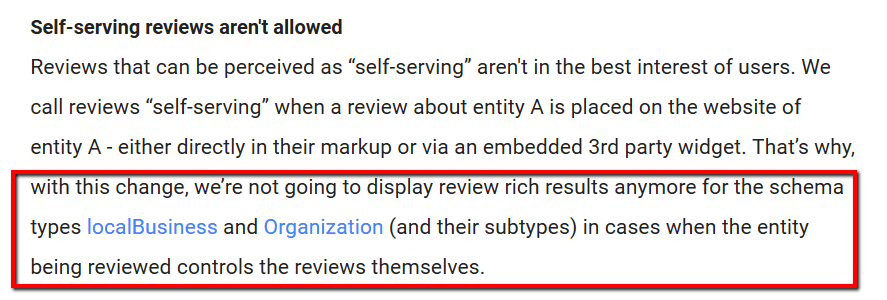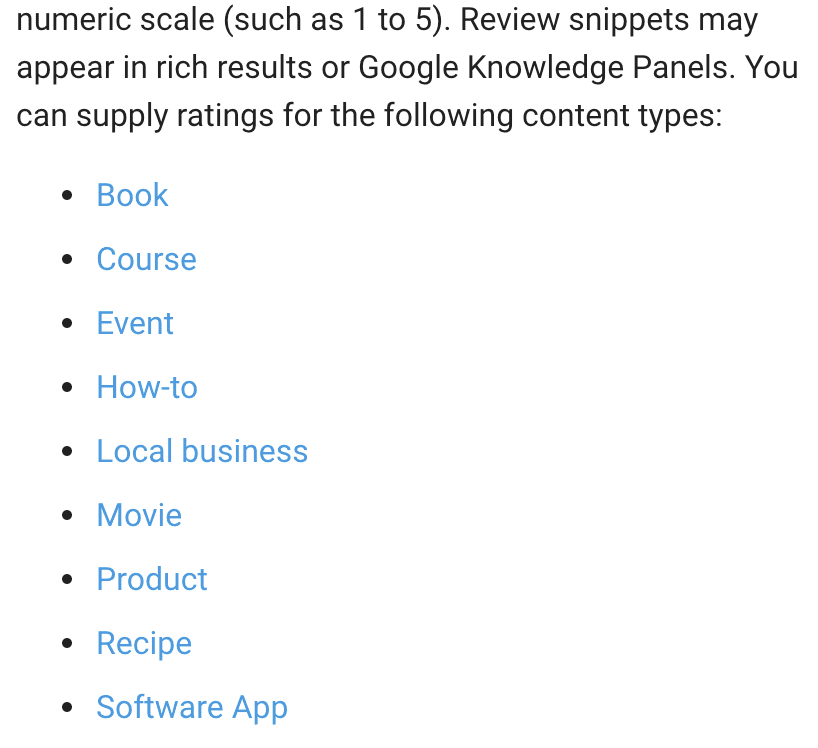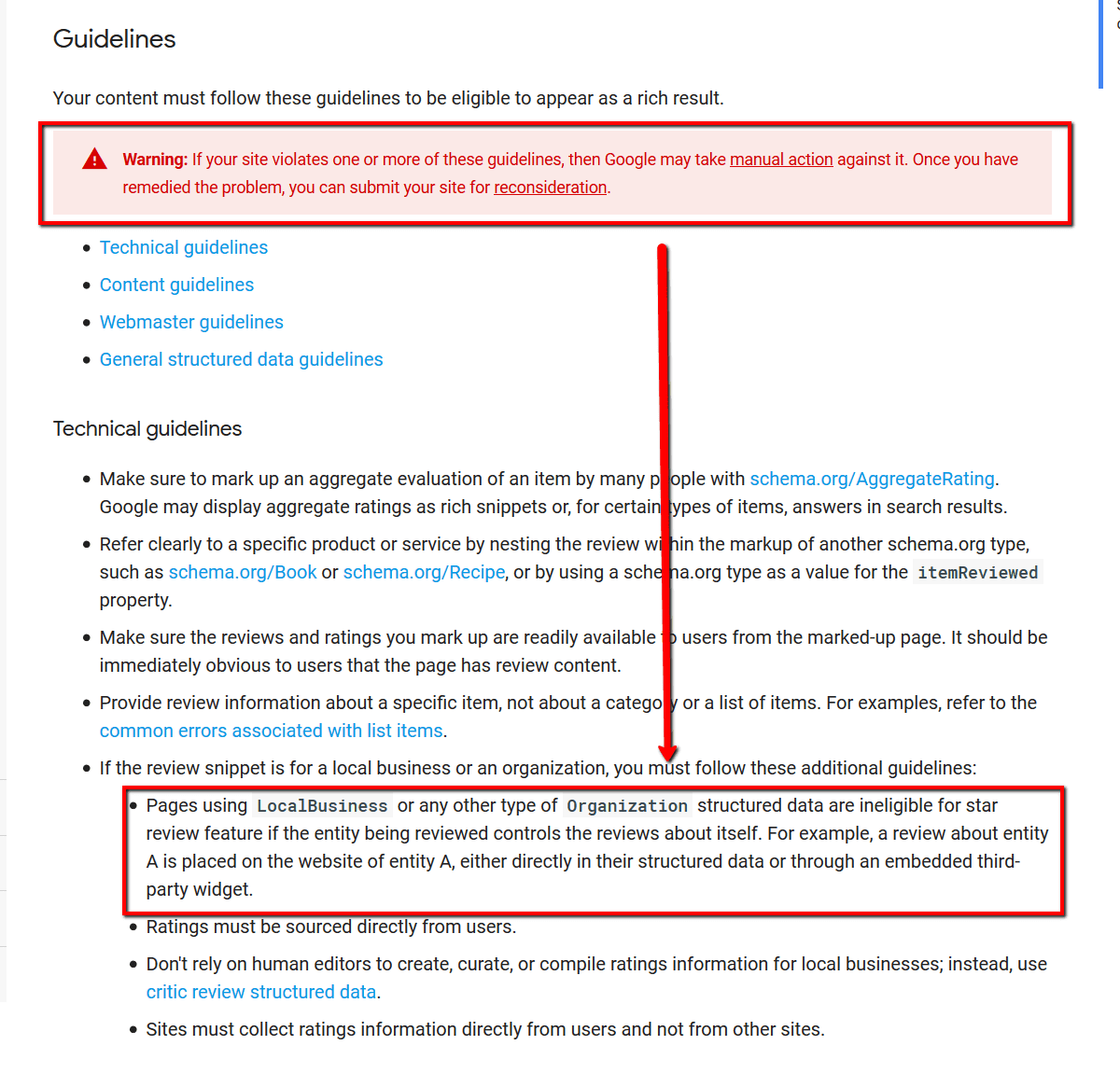What Google’s star rating rich snippet changes mean for you
On Monday this week, Google announced that they would be changing their treatment of star rating rich snippets in search results.

We already know that Google wasn’t happy with how star rating rich snippets (like those pictured above) were being used in the wild. “Structured data penalties” have become common in the past couple of years, mostly (in my experience) for the practice of placing organisation-level ratings markup across your entire site, which Google considered inaccurate or misleading (as the ratings weren’t for the specific content of the page they were on). Lots of examples of this exact behaviour continued to exist, however, with Google seemingly unable to enforce their own rules at scale (as is common for activities requiring manual review).
So what has changed?
It looks like Google is about to get far stricter on when they will and will not respect ratings structured data, the Schema.org property which has until now triggered these enhanced search results.
In particular, the use of a rating widget (e.g. Trustpilot, Feefo, hardcoded) to show reviews of your organization or business on a site that is run by your organization or business will no longer be respected. You can see Google’s updated guidelines here.
This covers probably the majority of real world use cases I’ve seen, although that may just be my experience.
What is Google aiming for, and what are they enforcing?
It seems that Google wants to push these ratings to apply mainly to critical or genuine 3rd party reviews – for example, a newspaper’s review of a film. Weirdly the distinction that Google is making in what they’re aiming for is whether the reviews are “self-serving” – I’d argue that having a website at all is fairly self-serving in most cases, unless you’re a charity or are running the reviews section of your site as an act of altruism.
Unfortunately, my pedantry isn’t going to get anyone their ratings back, but it does seem that for now there’s a distinction between what Google is aiming for here and what they’re actually saying they’ll enforce.

In particular, reviews of your own products on your product or category pages are handled somewhat ambiguously here – although marking up products is allowed, this could be only in the case of expert, 3rd party reviews (e.g. by a car magazine, of a car), rather than “self-serving” reviews (e.g. on the car manufacturer’s website, of one of their models).

This tweet from John Mueller at Google suggests reviews of products you sell are fine:
It’s specific to reviews about your business, we tweaked the text in the blog post to make it a bit clearer: “Self-serving reviews aren’t allowed for LocalBusiness and Organization” (reviews for, say, products you sell are fine)
— John (@JohnMu) September 16, 2019
But in most cases these could be your own products, in which case this seems equally self-serving, but Google will probably be unable to tell the difference. At the very least, Google seems at the very least to be implying by omission that they won’t enforce this.
I’ll update this article with some real world examples once it becomes clear whether this gray area remains an opportunity for website owners – right now, results are largely as before.
EDIT (26th September): Yes, you can just re-mark otherwise compliant ratings as product mark-up, with a named product, and get your ratings back.
Will I lose my star ratings?
Vendors
If the Schema.org “type” that star ratings on your site are attached to falls into the following list, then it’s very likely:
- localBusiness (if you are that business)
- Organization
- Service
If the type that star ratings on your site are attached to falls into the official Google list, but you are the vendor of that thing rather than a critical reviewer, then it’s somewhat likely you’ll lose your ratings, but not clear right now.
Critical Reviewers
Google has narrowed supported types, and now requires the “name” field, so possibly, yes.
You can check whether you’re using a supported type using the Google Structured Data Testing Tool, which has been updated to reflect the new guidelines, but which does not currently identify whether a review is “self serving”:

Should I care?
Vendors
If all your competitors had markup that also falls foul of this, and you do too, then the commercial impact should be net zero.
On the other hand, if you were a business large enough to have to play by the rules, and your competitors were getting away with sitewide organization review markup, this is a net win for you – and you don’t even have to do anything!
And, lastly, if you spent a ton of money on a 3rd party review platform to enable these features but your competitors didn’t, you’ll be understandably annoyed.
Critical Reviewers
Yes, you should care – this is a good way to make your results stand out in search, now more than ever.
What can I do to get my star ratings back?
Vendors
If you were previously showing reviews of yourself or your own product or service, your best bet is to hope that Google doesn’t enforce reviews marked up as product reviews, as I mentioned above. However, there doesn’t appear to be any risk of penalty – the guidelines only suggest that in a worst case you wouldn’t be eligible for star ratings:

Critical reviewers
If, on the other hand, you are a genuine third party reviewer but were reviewing a type that is no longer supported (e.g. a service), then there is no ambiguity about whether you may or may not be “self-serving”, so you just need to confirm your markup conforms with supported types.
Is this a good thing?
Generally speaking, a lot of the behaviour around how sites were being encouraged to collect and display reviews did seem disingenuous towards the user. In that sense, this may genuinely improve search results, and clarity of what a star rating means.
The other side of the argument is that Google is defining what webmasters should implement more strictly than the actual Schema.org specifications do, and they’re doing it unilaterally and without warning. This puts an onus on webmasters to make a change which can be difficult in larger organisations, and which may also wipe out the business case for previous, large investments of resource.
It would have been better, in my opinion, to make this a “from March 2020” onwards announcement, similar to the recent nofollow/sponsored/ugc link markup change.




